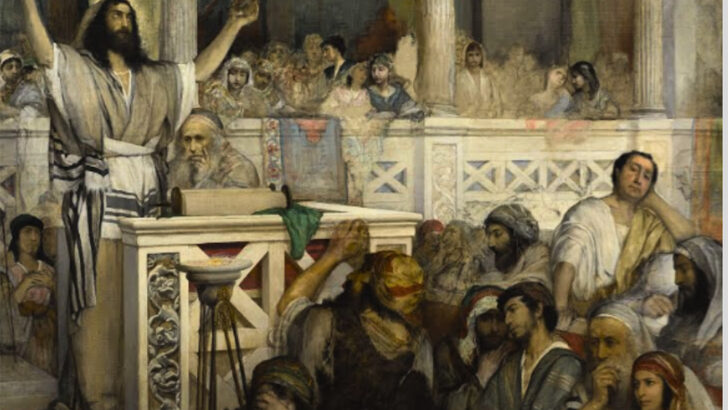Neh 8:2-4a, 5-6, 8-10
Ps 19:8, 9, 10, 15
1 Cor 12:12-30
Lk 1:1-4; 4:14-21
Every good love story has something from a personal and emotional note. I remember, for example, one of my favourite movies, the famous Sleepless in Seattle, with Tom Hanks and Meg Ryan. After losing his beloved wife, Sam Baldwin is making a difficult choice to start everything over and is moving to Seattle with his young son. However, changing the cities and surroundings doesn’t ease Sam’s sadness and lack of purpose. After months of misery, Sam’s son, Jonah, makes an anonymous call to the national radio program, from where the reporter calls back his dad. At first, the audition seems like a joke, but the radio reporter Annie starts listening to Sam’s story, and the chain of calls where Sam can express his feelings and be genuinely heard continues. The movie’s plot gets intriguing when the radio reporter Annie writes a personal letter to Sam asking them to meet in person at the Empire State Building on Valentine’s Day. That’s how their love story begins.
Community
This Sunday’s second reading, taken from the first Letter of St Paul to the Corinthians (12:12-30), gives us an impression of an instruction about what the Christian community, the Church, should look like. Let’s just look at this one: “As a body is one though it has many parts, and all the parts of the body, though many, are one body” (12:12), or at the end of it: “You are Christ’s body, and individually parts of it. Some people God has designated in the church to be, first, apostles; second, prophets; third, teachers; then mighty deeds; then gifts of healing, assistance, administration, and varieties of tongues” (12:27-28). St Paul gives here an instruction, a lecture on the nature of what we call the Church: it is a living and organic community. Although it consists of people, it is united in the power of the Holy Spirit. Though many, the members of that community should be united for one purpose. What is it?
Although all functions are important, it is not being an apostle, a prophet, or a teacher which matters the most”
Interestingly, this Sunday’s second reading precedes the famous chapter 13 of the First Letter to the Corinthians, the so-called Hymn on Love. It goes: “If I speak in the tongues of mortals and of angels, but do not have love, I am a noisy gong or a clanging cymbal” (13:1). No wonder couples worldwide choose this very “Hymn on love” as their first reading during the nuptial Mass, because it perfectly emphasises the purpose of their union: love. In fact, this reading is not just a passage written for wedding couples; on the contrary! St Paul, in his 13th chapter, has given the space and time to fully describe the most essential charism (feature) of the community of believers. Although all functions are important, it is not being an apostle, a prophet, or a teacher which matters the most. It is not the ownership of the gifts of healing, assistance or administration. No. All these, pointed out by St Paul, are not the essence. In the 13th chapter of his Letter, he describes what the Church is built of: “Love is patient; love is kind; love is not envious or boastful or arrogant or rude” (13:4).
Love
Yes, the necessary ingredient of the construction which we call the Church is indeed love, and without it, everything sooner or later collapses. St Paul speaks, in this case, not of some general kindness which, by the way, everyone should have for another. The Bible uses here the word ‘AGAPE’, the love which is selfless, the act of expecting nothing in return. That is the first and most crucial material to be shared and multiplied by all of us, the Church members.
Nothing hurts more than a dismissive answer: ‘It’s not my business’”
I guess that we all have, in some ways, the experience of the Church’s institutions, which, although efficiently dealing with the ‘workload’, did not always make a good impression on its visitors. Sometimes being right, and others not, many feel that the Church should be renewed or even ‘de-institutionalised.’ Some will say that the Church is not right in the way how it deals with women, while others would argue that its ministers are arrogant or too clerical. Indeed, we can always work on sharing the responsibilities and making others not feel excluded or dominated.
But let me share with you that nothing hurts more than a closed door when one needs to come in. Nothing disappoints more than a cold ‘no’ when one is asking for the time to talk and be heard. Nothing hurts more than a dismissive answer: “It’s not my business.” The litany could go on and on, and certainly, Dear Readers, you could add much more to it. The biggest problem which we might be facing in the Church is surprisingly not the crisis of this or another, but it is the crisis of the lack of selfless love between each other, the love which should unite us together. And if you think that I exaggerate, have a look, once again, at what St Paul says: “Love never ends. But as for prophecies, they will come to an end” (13:8).
Healing
A Dominican Biblical scholar, Fr Lagrange, while speaking of today’s Gospel (Luke 4:14-21), notices something simple yet profound: “Jesus went on to explain how this scripture was now fulfilled, gently leaving His hearers to conclude that the messenger who brought them news of this grace was no other than Himself” (The Gospel of Jesus Christ, p.124). When Jesus reads the words of prophecy, taken from the prophet Isaiah, the Lord announces in the synagogue that now is the time of Salvation. They can find cures and healing from all kinds of blindness, oppression, envy, jealousy or selfishness in Him.
Now I remember why I like the famous Sleepless in Seattle so much. The man who was knocking found the door opened for him. When he was talking, he was heard. And when he was asking for help, he heard: “It is my business too.” The acts of selfless love change us. They also change this very Church of ours. There is only one way to renew the Church, and it is through its members.
Fr Dominik Domagala, OMI, serves in Inchicore, Dublin. Studied Theology in Poznan (Poland) and currently is working on a Licentiate in Sacred Scripture. Author of the sermon-video-blog ‘The Social Oblate’. Send your questions to thesocialoblate@icloud.com


 Fr Dominik Domagala
Fr Dominik Domagala Christ teaching at Capernaum, Maurycy Gottlieb
Christ teaching at Capernaum, Maurycy Gottlieb 